From Kathmandu to Kyoto: Following the elephants' trumpets
How Sanjeeta Pokharel carved a career in elephant science against the odds and why their survival drives her work.
By Monalisa Paul
| Posted on September 23, 2025
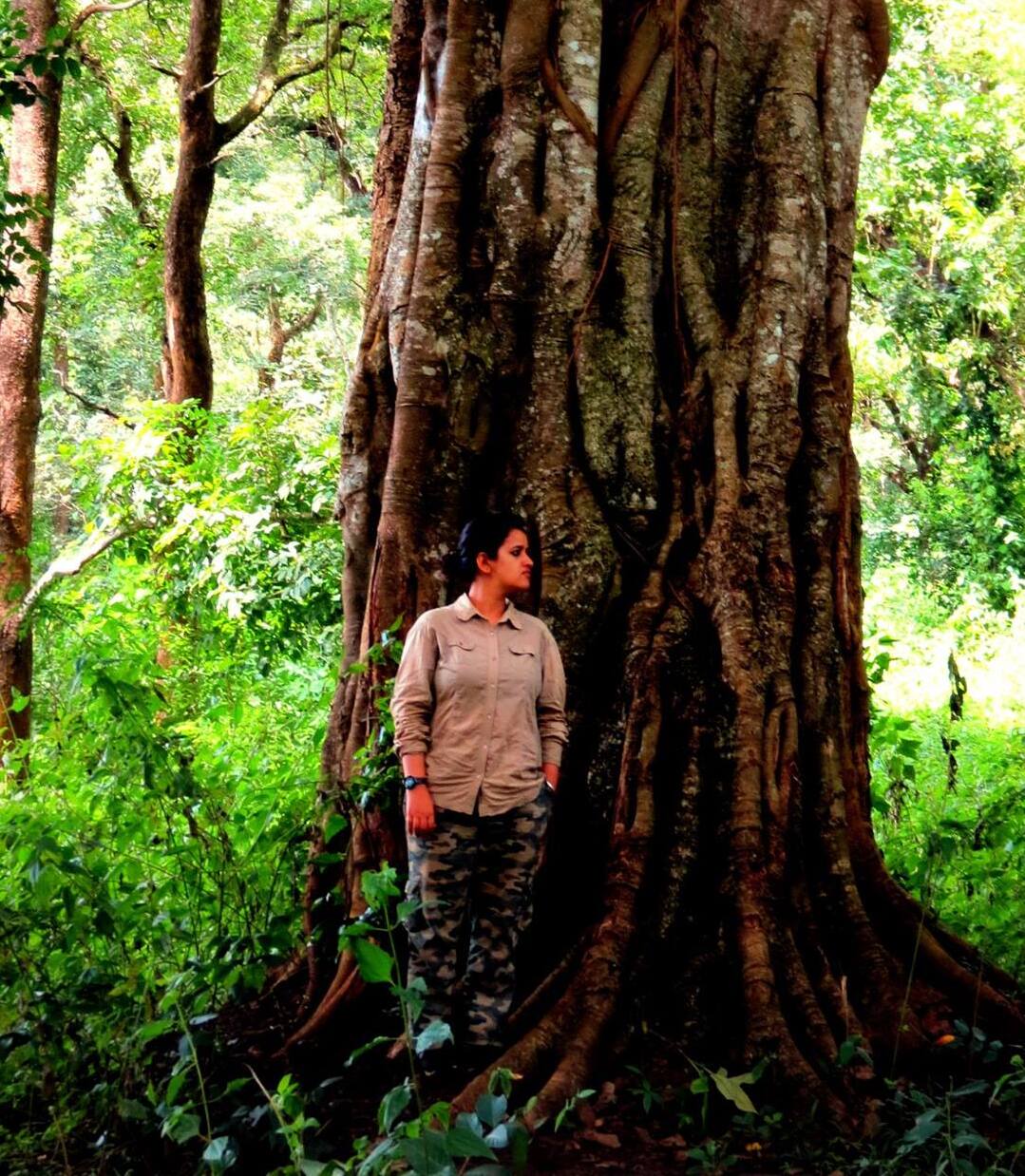
New Delhi: Who wouldn’t be drawn to study one of the world’s most iconic and beloved species? And yet, only a few dare to enter their world. Studying wild elephants means long days in unpredictable terrains, patience, and the humility to accept that answers don’t come easily.
Growing up near forests in a remote part of Nepal, Sanjeeta Pokharel often dreamed of uncovering the secrets of animal behaviour. There was no clear career path in science, but she pursued it with determination. In an era when internet access was scarce, she visited cyber cafés to write to institutions abroad, seeking opportunities.
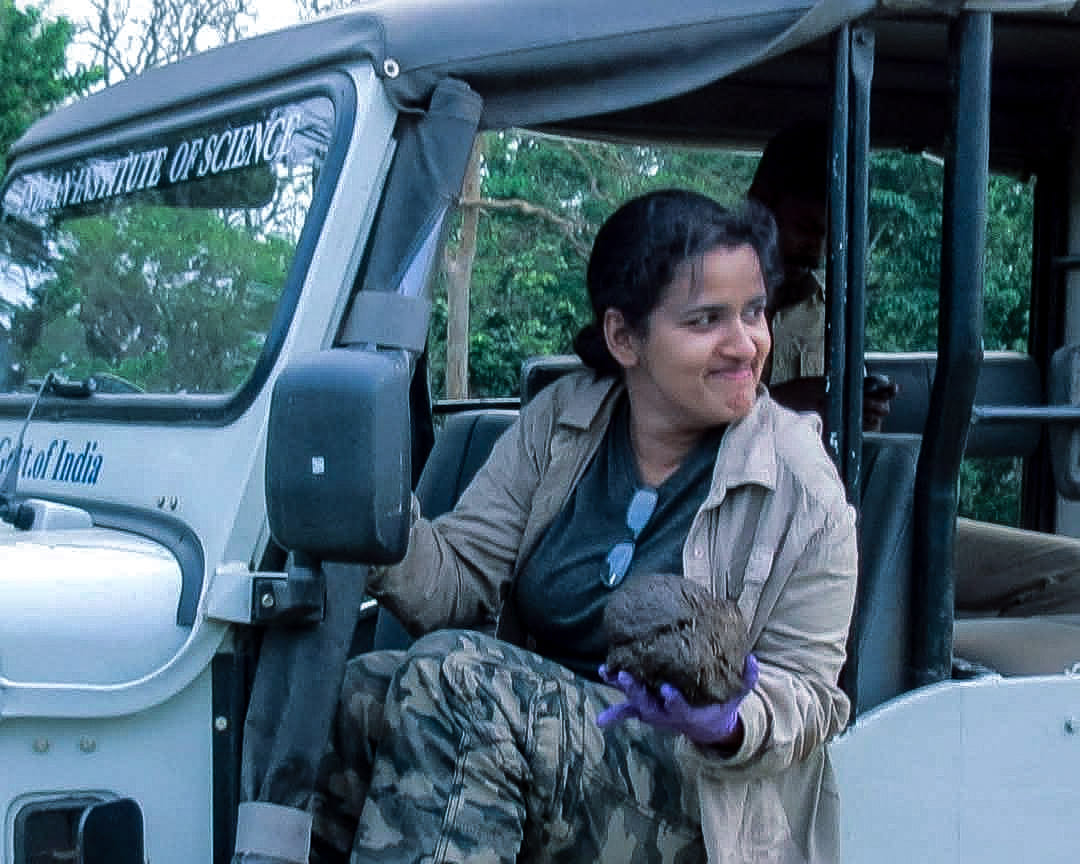
“India is my karma bhumi,” says Sanjeeta
That opportunity arrived in 2007. Amid Nepal’s political unrest, the Indian Embassy in Kathmandu announced scholarships under the Indian Council for Cultural Relations (ICCR) for meritorious students from Nepal. The strike-hit city was paralysed, but Pokharel set out on foot for the interview.
“I walked more than eight kilometres through burning tyres and shouting crowds,” she recalled. “I didn’t have a phone or map, but I kept asking strangers for directions. Every step through that chaos was driven by the hope this opportunity could change my life.”
Covered in soot and dust, she reached the Embassy just in time. “As I stepped in, they called my name. Had I arrived even a second later, the door to my future might have closed.”
She was awarded the ICCR scholarship and enrolled in the Institute of Environmental Studies at Kurukshetra University in India, graduating with a Master’s in Environmental Science. Her thesis at the Wildlife Institute of India in 2010 marked the beginning of her career in wildlife research. “That was where I learnt how to ask the right questions and spend long days alone in the field,” she said.
After her Master’s, she returned to her country and joined World Wide Fund, Nepal as an intern in 2011, working on gharials in major river basins. “It might have been just an internship to others,” she said, “but to me, it was everything.”
She remembers her first stipend at WWF Nepal was 5,000 Nepali rupees a month in 2011. “Honestly, the money never mattered,” she said. “What mattered was the purpose, the chance to be out there, to learn, to live the work I had always dreamed of.”
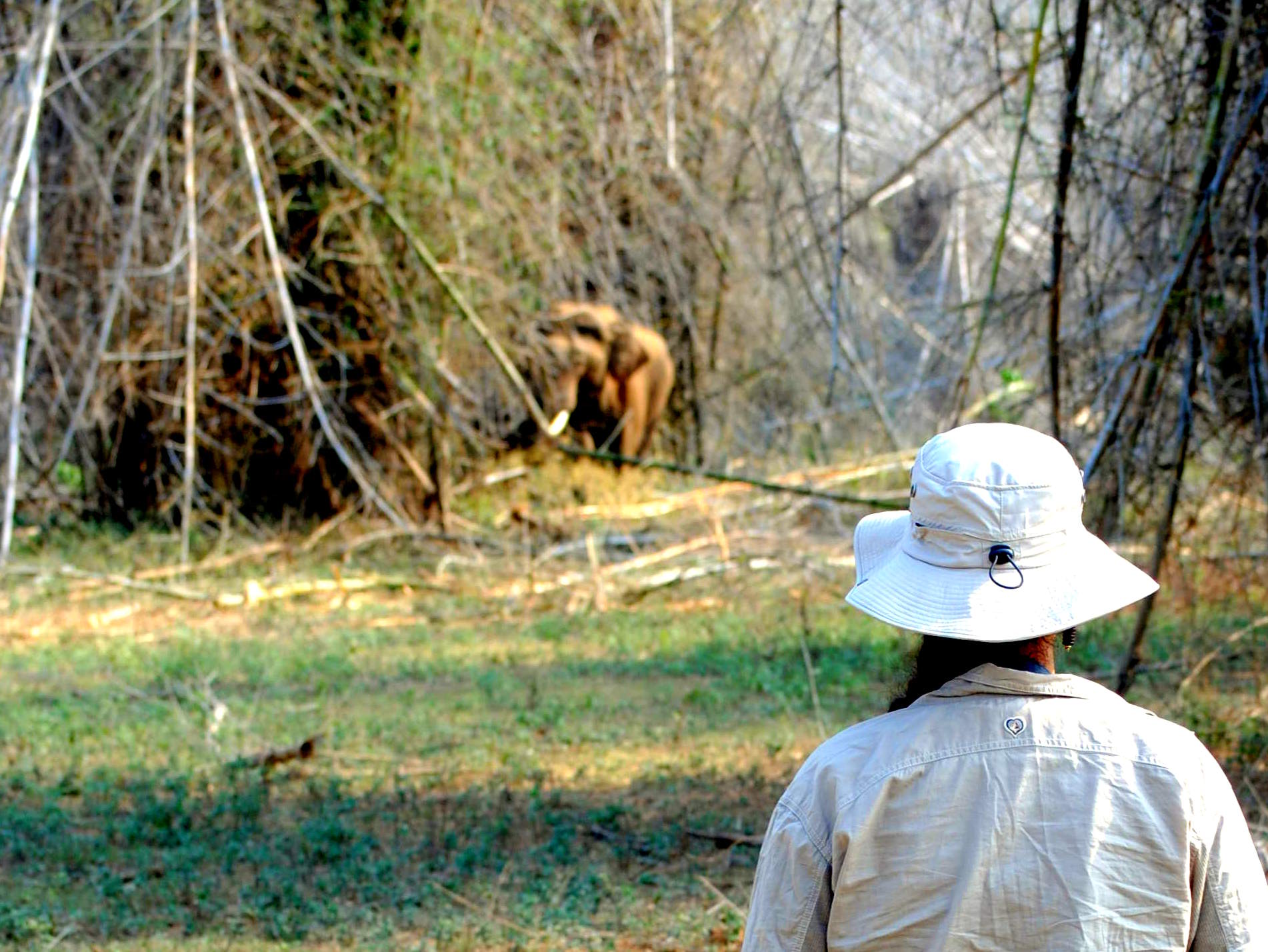
Sanjeeta observing elephants in Nagarahole
Where it began
During that internship, a new chapter began. Pokharel received two PhD offers, one from the United States and another from the Indian Institute of Science. She chose the latter, joining the lab of Raman Sukumar, a leading figure in Asian elephant research. “That’s where it all began,” she said. “My journey with elephants.”
Her doctoral work took her across the Western Ghats and the forests of Karnataka, Tamil Nadu, and West Bengal, following wild Asian elephants in difficult terrain. She studied how intense human-elephant conflict affects the animals’ physiological well-being, contributing to a field, stress physiology in wild Asian elephants, that had seen little research globally.
“India is my karma bhumi,” she said. Learning the local languages, she felt, was part of respecting the places where she worked. Just as important was building trust with local communities. “When you respect their traditions, they respect your work,” she said. Once, while she was so absorbed in tracking elephant movements and collecting dung samples that she forgot to eat, villagers noticed and offered her food. “Small gestures like that made the toughest days easier.”
Among her many honours, she received the “Outstanding Woman Scientist” award from Kyoto University, Japan, and in 2018 was conferred the “Nepal Vidya Bhushan – Category A” Presidential Medal, one of the country’s highest academic distinctions. She also became the first Nepali woman to be nominated as a member of the International Union for Conservation of Nature Asian Elephant Specialist Group. “This journey was never mine alone,” she said. “It’s a story written with the quiet strength of my parents, and the unwavering support of my sister. They stood by me through every struggle, every uncertainty.”
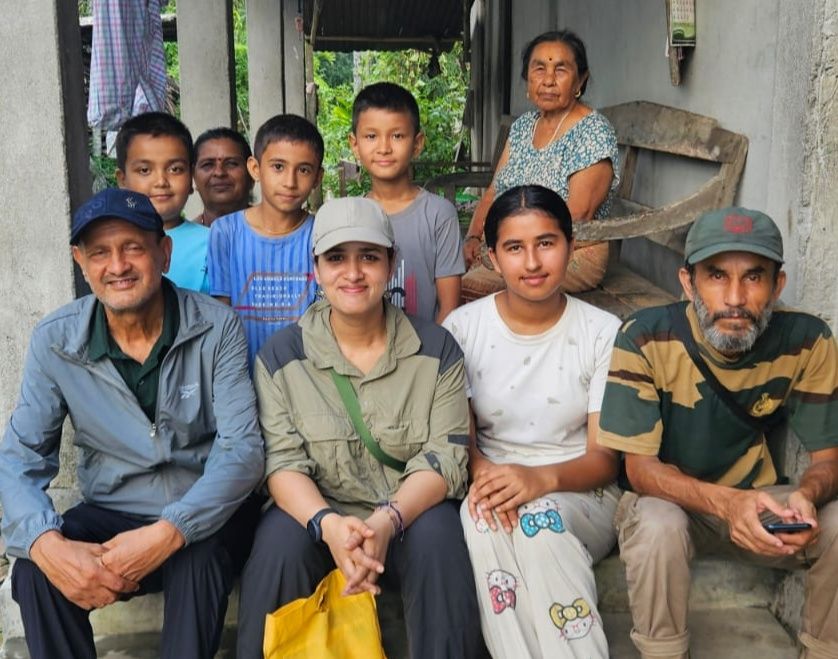
In Nepal during a recent visit
Balance
Pokharel is now a Hakubi Assistant Professor at Kyoto University, one of the institution’s most competitive fellowships. Her research focuses on the evolutionary history of elephants by studying extinct proboscideans, the ancient ancestors of modern elephants. She seeks to understand the factors that led to their extinction, and whether today’s elephants face similar risks. “My deepest concern is for the elephants themselves,” she said, “how they adapt to the increasing conflicts and challenges they face today.”
Alongside her academic work, Dr. Pokharel writes poetry and columns, contributes to The Times of India and The Hindu, and has been featured in global media such as BBC and National Geographic. She also created “Bhunte: The Baby Elephant,” a cartoon series that explains elephant science in simple ways for children and adults alike. During the pandemic, she launched “Project Positive 365,” sharing daily uplifting stories to support mental wellbeing.
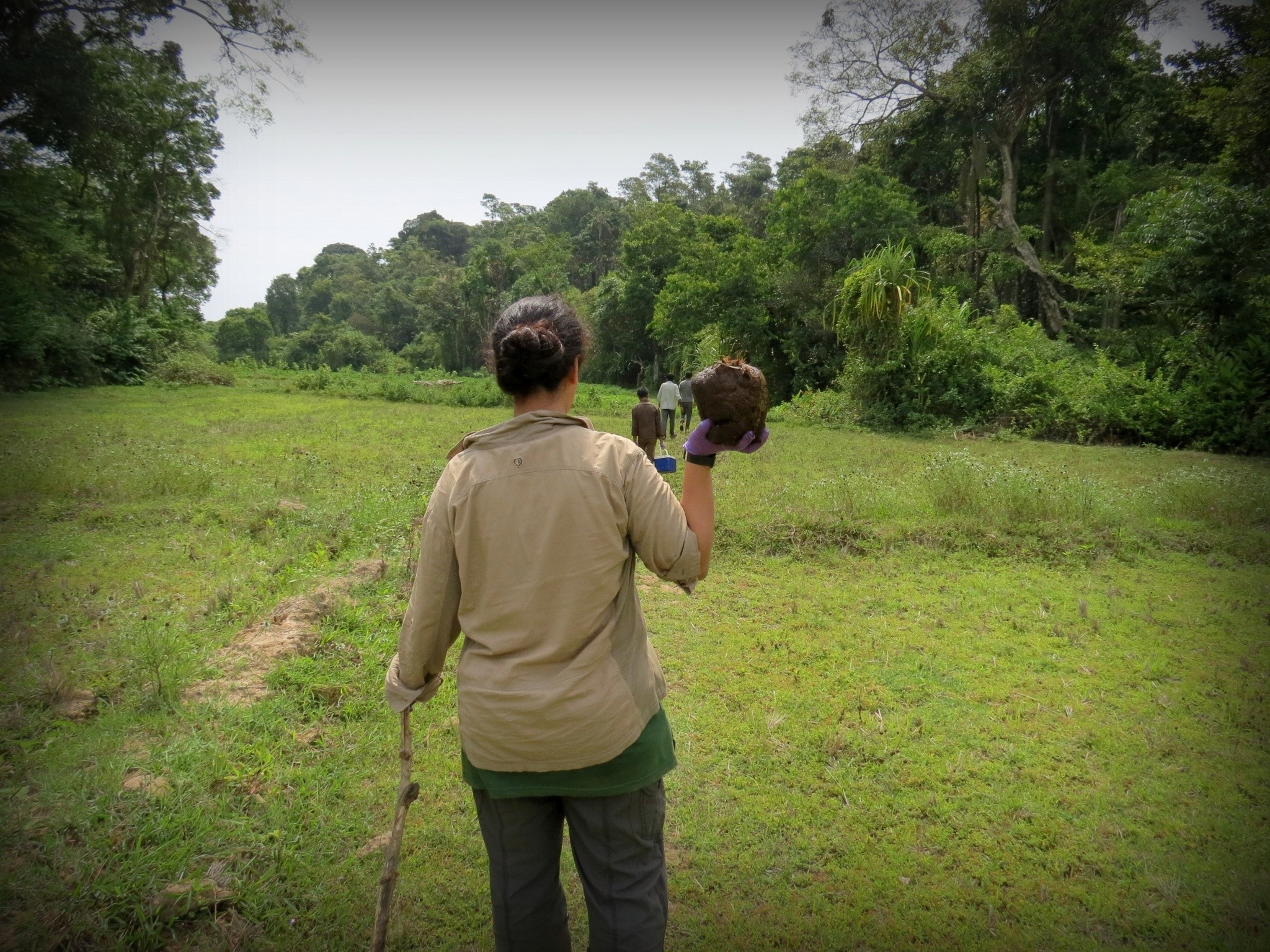
Tracking elephants and collecting dung samples, all in a day’s work
Fluent in five languages, she balances her roles as researcher, mentor, artist and advocate.
“My deepest concern,” she said, “is how elephants will adapt to the conflicts and challenges they face today.”

About the author
Monalisa Paul is an author, teacher, researcher, podcaster, and environmentalist. She completed her undergraduate and graduate studies in zoology and her PhD in environmental management, with a focus on the biotic interactions of Lepidoptera in urban landscapes. Soon she started writing science fiction that spotlighted environmental issues as a way to appeal for responsible action. More than ten of these stories have appeared in the popular science magazine Science Reporter. She is passionate about reading and wants to promote the habit in the younger generation.

Add a Comment